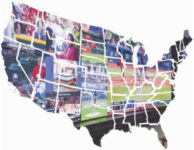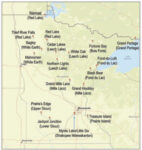
In January, I received the good news that the International Center for Gaming Regulation (ICGR) at the University of Nevada, Las Vegas had awarded me an academic research fellowship to produce a report that will provide an overview and analysis of the techniques and needs for training and education programs for tribal government gaming commissions.
The ICGR—a partnership between the International Gaming Institute and the William S. Boyd School of Law—launched its fellowship program two years ago in support of its research mission and goal of providing actionable intelligence to gaming regulators worldwide. In addition to my own fellowship, the ICGR also awarded a fellowship to Kahlil Philander, assistant professor at Washington State University’s Carson College of Business.
Professor Philander will research current educational programs for workers in responsible gambling and conduct a training needs assessment study to develop an education program for specialists working in the industry. Taken together, we hope to triangulate the perceived education and training needs of operators and regulators against the current training and education offerings in these two important areas.
With their support, I have begun to develop a tribal regulation education and training inventory and analysis that will provide a comprehensive assessment of the training and education needs of tribal government gaming regulatory institutions and the techniques and practices that could meet those needs. Ultimately, this work will weigh the perceived educational needs of tribal gaming regulators against the course content of existing education and training options and highlight the ways that tribal governments develop institutions and strategies that support both nation building and corporate governance.
This research topic is critically important and timely for a number of legal and political reasons, including the negotiation of sports betting legislation in several states where tribal governments are the primary casino operators, the tribal gaming industry’s growing interest in fantasy sports and eSports, and the tribes’ collective commitment to address responsible gaming.
This analysis will also highlight the fact that tribal government gaming is now a mature industry. The Indian Gaming Regulatory Act (IGRA) was passed 30 years ago, and tribal governments and tribal regulators have evolved beyond mere compliance with the National Indian Gaming Commission’s (NIGC) Minimum Internal Control Standards. Tribal regulators are routinely innovating the industry, and seek training in courses that address “the casino of the future,” or active shooter training, human trafficking, or technology and cybersecurity.
By documenting and analyzing the need for education and training for American Indian regulatory agencies, this project will provide insight into the ways that tribal governments and commissioners consider themselves part of the current casino legal and regulatory policy discussions, as well as the ways that they are operating as sovereign nations protecting the tribes’ assets and reputation.
Significance and Impact
This research project will result in a white paper and several presentations, beginning at Global Gaming Expo 2018, that will provide an inventory and analysis of the range of tribal regulatory institutions, efforts and a proposed framework for determining the best techniques for future education and training. These presentations will include the participation of training experts from the NIGC and the National Indian Gaming Association (NIGA), as well as representatives of educational institutions that focus on gaming education, including SDSU and UNLV.
This research will highlight the fact that tribal governments are both operators and regulators of tribal gaming, where the lines between the two can sometimes blur. I have heard from several tribal regulators that there is a need for more training to distinguish and clarify the roles of operators and regulators. Sometimes, operators will involve commissioners in human resource issues by re-defining them as licensing issues rather than discipline, or evaluate casino employees along management lines or job requirements. Additionally, there is a need to develop “best practices” in areas like IT vulnerability or cybersecurity, which are beyond the minimum regulations required by IGRA.
It is my intention that this research will also benefit tribal education efforts across Indian Country, including the NIGC and NIGA. First, tribal governments in the United States are often called upon to present their regulatory information publicly, including responding to inquiries by the General Accounting Office (GAO), which prepared a report that revisited the tribal-state compacting process.
As part of its inquiry, the GAO examined the federal, state and tribal role in gaming regulation, but failed to provide a complete overview of the robust regulatory regimes created by and delivered at tribal facilities. Second, in addition to providing a complement and counterpoint to the GAO’s recent report, this research can facilitate tribal-state compacting negotiations in several states, where local and state governments continue to use arguments related to a “regulatory gap” to overcharge tribal governments for duplicate work performed by state regulators.
Additionally, the project has the potential to encourage productive and mutually supportive relationships with those engaged in the policy debates surrounding tribal gaming regulation, including an analysis of the relative costs of enforcement actions versus the cost of training and education.
Ultimately, this analysis can help verify the scope and effectiveness of tribal regulatory initiatives, perhaps easing intergovernmental relations and strengthening tribal nation building in regions where non-tribal neighbors continue to question the benefits of tribal gaming to communities.









